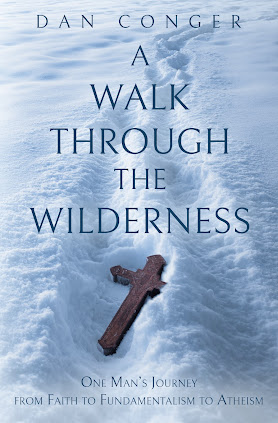Today, Feathered Quill reviewer Kimberly Trix Lee is tal
king with Dan Conger, author of A Walk Through the Wilderness: One Man's Journey from Faith to Fundamentalism to Atheism.
king with Dan Conger, author of A Walk Through the Wilderness: One Man's Journey from Faith to Fundamentalism to Atheism.
FQ: This is a deeply personal story. I’m curious what made you decide to write it all down to be shown to the public eye?
CONGER: During recovery from the cult, I did a lot of journaling. Lots of writing about my experiences, feelings, reactions, personal evolution, etc. Not only that but given how much writing I did in the cult itself, there was a lot of material available. It was during the time of our struggle with infertility that I first began toying with publishing a book about the story. Partly because the act of writing was just so cathartic, and partly to be of help to others who may be struggling through similar situations. As the torment of our miscarriages continued to compile, my wife and I both realized that the continuation of our journey might also be helpful to others struggling to start a family. Together, we decided that we wanted to tell this story primarily to be of help to others, but also because of the ongoing healing that talking about it brings to ourselves.
FQ: I can only imagine the feeling of seeing the group you believed in for the last decade of your life crumbling in front of your very eyes. In the moment when the Assembly started collapsing from within, what do you remember feeling?
CONGER: There was a whole range of emotions, and it was definitely something of a process...it started with one feeling and then evolved into another and another. At first, there was disgust, anger, and betrayal. How could this man have done this? How was he able to live such a double life and look at himself in the mirror every day? During my initial reaction of disgust and anger, I threw away all the books written by the cult’s founder. In hindsight, I wish I had kept them. They were a huge part of my personal journey, and thus important. As the group began its worldwide collapse, sadness was the primary emotion. I felt like something dear to me had died. My whole life had revolved around this, and it had given me purpose and direction. Now that it was all collapsing? I felt adrift and like I needed to start everything all over again. As I said in the book, once I realized it was all going to come to nothing, I spent an entire prayer meeting in tears. I had this vision of where my life was going to end up, how I would continue to “serve the Lord,” where I might end up living, etc. All of that future expectation was removed in a matter of a few months. It left me feeling very sad for quite some time.
FQ: During the decade of your involvement in the Assembly, you pulled away from your parents. Would you be open to tell us how your parents reacted once the media got hold of the Assembly’s collapse? How did they communicate with you after the Assembly went dead in the water?
CONGER: As things began falling apart one of the first things I did was to reach out to my parents, extended family, and old friends and step by step begin to work towards repairing those relationships. Thus, they heard it from me and not from some external source. I would say that the primary emotion my folks expressed was one of relief. They felt like they were getting their son back. I had become a meme of myself during the Assembly period and now I was becoming the same carefree person they knew before. They asked tons of questions. My father, being retired law enforcement, was adamant that felony criminal charges needed to be immediately leveled against the founder’s son David, and he also believed an investigation needed to be done into George himself for possible embezzlement among other things. It wasn’t uncomfortable at all for me, however, and that might sound strange. I was just happy to be openly talking about things that I had been told for years not to mention to a soul. That conversation with my folks is still ongoing, and they have expressed to me that reading the book has been extremely cathartic for them as well.
FQ: Would you also be open to tell us how you restored your relationship with your parents?
CONGER: It was all about communication. I was bluntly honest with them about everything that had transpired and that I knew. However, even though I was out of the cult, I was still a fundamentalist evangelical for a couple more years. My faith very slowly evolved after leaving the group, so there would still be disagreements between them and me over the years after the cult when it came to things in the Bible that I still believed, but that they took symbolically or flatly disagreed with. The restoration took a commitment on both sides to be very open and honest with each other in a spirit of love and understanding. Conversations, both long and short, helped to restore what was lost. Also, I had a very happy childhood and lots of good memories to fall back on as we became closer again.
FQ: Can you tell us about the moment when you first told Chanthy about your decade-long experience in the Assembly?
CONGER: Everyone in my sphere of influence knew I was Christian. I still wore it on my sleeve pretty proudly even though by 2010 when I met her my faith was extremely liberal in every way. She was also a believer, being a Catholic but not active in the church. In addition, she was renting a room from a Jehovah’s Witness when I met her, so she had some exposure to that cult (and, yes, I firmly and unswervingly label that group a cult). All that to say when I mentioned that I had been in a cult group in the past, she was concerned at first and needed to have several very long conversations about it, but in the end, she was OK with the fact that it was well in my past and I had become a different person. Once again, communication with honesty and love is the key. I was totally open to all of her questions, soothed her concerns, and here we are today.
FQ: In this entire turbulent journey of tragedy and triumph, do you regret anything? Would you change anything if given the opportunity to do so?
CONGER: The answer is both yes and no.
There are two kinds of regret here. One, there is the regret that I hurt people. I said and did things to people both in and out of the group that caused pain and anguish. For that, I am very deeply sorry and would that I could heal all the hurts I caused. That regret, of pain caused to others, is one that I will carry some measure of guilt over for the rest of my life.
However, for many people, it is the second part of this question that represents a different kind of regret. The “I wish I could take back a life-changing decision” regret. This, I don’t have. I would not change any of my major life choices. Why not? The sum of our life choices makes us who we are in the present. I am very happy with my life as it is. I am happy with myself and my continued growth and evolution as a person. I am happy with my wife and our amazing son. I think, for many, they wish they could have made different choices because they imagine their life could be better in some way today had they done so. Thus, since 1) I am happy with where I am, and 2) the choices I made got me to where I am, then 3) why would I change any of those past choices? Yes, I regret any and all hurt that I caused during my time as a fundamentalist evangelical. No, I would not change my major life choices because they got me to where I am and I am very happy with my life.
FQ: It all depends on the individual and the circumstances surrounding the individual at that point in time of course, but considering everything that you’ve gone through, what would you suggest is the best way to prevent other people from potentially getting ensnared in a cult?
CONGER: As a society, we need to do a far better job of teaching people critical thinking skills. So much of our education, and our time in the world as a whole, is spent memorizing and regurgitating facts. While this, too, is necessary, it is far more important to develop good critical thinking skills and good common sense. People need to be taught to ask the right questions. Understanding the “why” of a situation, the reasons behind a situation, is often far more important than understanding the facts of the situation. It was my naivety and idealism, paired with a life-threatening event, that drove me in. Had I been in possession of better critical thinking skills I think I could have avoided involvement. If someone had employed a good tool like Street Epistemology and taught me those evaluation skills, I probably never would have joined.
FQ: Would you have any words of advice for couples who are having infertility problems or those who are hesitant about adoption?
 |
| Author Dan Conger |
CONGER: Yes, my wife and I absolutely do. First, regarding infertility. Step one for any couple is that the male needs to undergo a sperm DNA fragmentation test. It costs a few thousand for a good one, but it would have saved my wife and me a huge sum of money had we discovered early on that there was simply no way for me to ever father a child. That is the only medical advice we would give because it can provide a pretty definite answer about the male portion of the equation right at the outset for a reasonably low investment. Other than that, have a regular relationship with a very good family therapist and communicate with each other about everything. Talk about how you feel (physically and emotionally). Talk about your thinking, no matter how dark the thoughts may be. No relationship is successful without good communication, so always communicate about all things.
Second, about adoption. This is a word we didn’t even want to hear spoken aloud during our infertility struggles. We understand the reaction to the thought, even the visceral reaction, when a couple is trying so hard to conceive. We were there. However, should you choose the adoption path, your odds of fulfilling that dream of becoming parents is about as close to 100% as it can get. Our son is amazing. We are Mommy and Daddy. When he wakes up, comes charging from his bedroom (the pitter-patter of tiny feet), bursts into our room, and shouts, “Mommy, Daddy, it’s time to wake up!” There is no feeling like it. We wondered if we would ever even have this experience, and now we could not be happier.
Back to the question about regret: there are none here. We do not regret adoption at all and we could not be happier as parents. Adoption is a beautiful thing, and our son is the center and joy of our lives. Consider adoption should you be unable to have a child biologically. Neither my wife nor I have ever looked back.


No comments:
Post a Comment